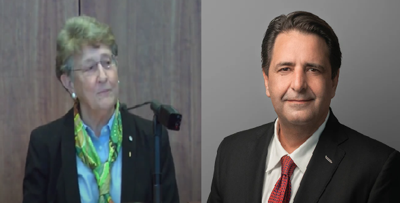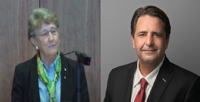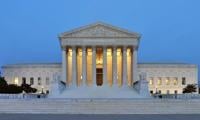
Jean Toal, left, and Peter Protopapas
COLUMBIA, S.C. – South Carolina’s asbestos judge yesterday justified her reasons for appointing a local lawyer to control a company in court, citing what she calls a history of “moral fraud” by Cape Plc.
Judge Jean Toal issued a 49-page order to address concerns outlined earlier this year by the state Supreme Court with her practice of naming Peter Protopapas as receiver over companies that face asbestos suits in the state.
As receiver – usually for companies that haven’t existed for decades – Protopapas is authorized to collect assets like money from old insurance policies, place them in secretive Delaware funds and keep a large percentage for himself.
As receiver for Cape, which is still solvent and has fought the appointment in overseas courts, Protopapas is suing companies he says historically controlled Cape and should be forced to pay Cape’s asbestos liabilities. A trial begins Oct. 20.
Judge Toal has been ordered to give monthly updates on the case to the Supreme Court, which in May possibly restricted her ability to use Protopapas as receiver. In Welch v. Atlas Turner, the court affirmed Protopapas’ power over Atlas Turner because of its “moral fraud against the trial court.”
However, it called the case unusual and said the receivership is “an extraordinary remedy reserved for the most extraordinary cases.” Toal feels the Cape receivership involves a similar “moral fraud” as the Atlas Turner case.
“Cape’s conduct, like Atlas Turner’s, was the product of company policy,” Toal wrote. “Cape, however, was far more ruthless and deliberate than Atlas Turner.
“The scale of Cape’s asbestos fiber sales into the U.S. market, its indifference to the harm these sales would cause in light of the scope of its unique, early knowledge of the health hazards and the ruthlessness of its campaign to avoid U.S. liability from the raw asbestos fibers it sold to be used in every state in this country – a campaign that continues to this day – provides the foundation for Cape’s unparalleled moral fraud.”
Cape is a unit of U.K.-based Altrad Group that was once a South African asbestos-mining company, although it ceased selling asbestos in the 1980s. Altrad bought Cape in 2017 and is one of the defendants in the upcoming trial.
Cape established the North American Asbestos Corporation in 1953, and it sold asbestos to the federal government and companies like Owens Corning, Johns-Manville and Pittsburgh Corning.
When asbestos lawsuits started popping up in the 1970s, Cape refused to appear in court or accept complaints, then liquidated NAAC in 1978, Toal’s order says. A new company called Associated Mines took NAAC’s place, she added, as Cape avoided U.S. courts.
The company has recently obtained a $1.3 million penalty against Protopapas in a U.K. court for illegally interfering in Cape’s business. Protopapas did not show for court proceedings there.
Altrad is now seeking $34 million in damages from Protopapas in France. Toal took issue with these international moves and claims Cape misled the U.K. court during proceedings there.
“Cape’s English lawyers have used the U.K. Order to intimidate the Receiver from continuing to act in his court-appointed capacity as the Receiver for Cape,” Toal wrote.
“In a series of letters starting in November 2024, the lawyers have threatened the Receiver with personal financial penalties and criminal sanctions with one objective in mind—to stymie the judicial process here in South Carolina that exists to serve South Carolina claimants.”
While Toal, a former chief justice of the state Supreme Court, has kept settlement amounts and disbursements secret under her agreements with Protopapas, the public record suggests he has collected tens of millions of dollars so far with authority to use it for “litigation expenses” including paying asbestos plaintiffs, their lawyers and himself.
Protopapas is in the unusual situation of arguing in court, purportedly on behalf of Cape, that its corporate parent should pay Protopapas millions of dollars in damages for allegedly trying to evade liability in U.S. courts.
Protopapas has made these arguments without ever mentioning to the court Cape won a landmark decision in U.K. courts in the early 1990s refuting the claims he is making on Cape’s behalf.








